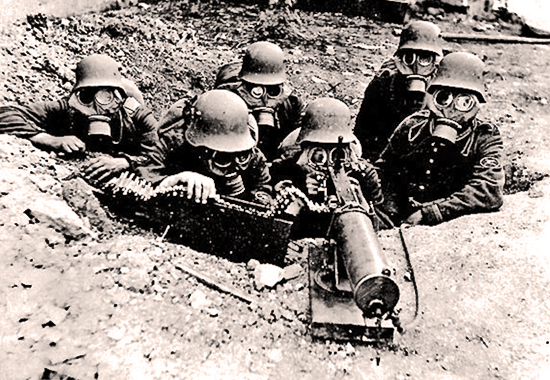
Alan: Recently, friend AC -- a retired Air Force general and amateur historian -- confessed ignorance of World War I's "cause." How could that be? Surely, this razor-sharp 95 year old -- a fellow who journeyed to 200 countries and both poles twice -- would supply a plausible rationale. Human beings are meaning-seeking creatures and will find meaning even where there is none. But war is seldom meaningful. It is nearer truth to construe such fits of organized bloodletting as "exercises in meaninglessness" whose chief purpose is to prolong the age-old ruse whereby stupidity, ignorance and human sacrifice are glorified. And not only glorified, but deified. To re-enact this vanity -- this emptiness -- it is necessary to disguise bloodlust with the grandeur of idealism. Obscured by this mantle of feigned nobility, war is propelled by chthonic urges to demonize "others," then "to kill the devils." Canadian Prime Minister Brian Mulroney described the mechanism: "In politics, you need two things: friends, but above all an enemy." Typically, old men designate enemies and wage wars. They wage them for no loftier motive than reinforcing dominance-submission hierarchies. The whole tawdry business is breathtakingly zoological. Against this backdrop, young bucks fall like dominoes, fighting their elders' wars for the climactic rush of shooting hot projectiles in proof of their manhood. In the end, this toxic blend of haughtiness and hormones is no more sensible than a bar room brawl. People "take sides," "fly their colors," and fight because they're spoiling for a fight. We want to kill somebody. But even more, we want to feel good about it. Preferably noble.
***
"Why We Fight"
***
"We Like War Because We're Good At It"
George Carlin
http://paxonbothhouses.blogspot.com/2013/09/george-carlin-we-like-war-because-were.html
***
"We Like War Because We're Good At It"
George Carlin
http://paxonbothhouses.blogspot.com/2013/09/george-carlin-we-like-war-because-were.html
***
There are theories galore — and an equal amount of finger-pointing. Germany was to blame, many insist. No, it was Austria-Hungary or maybe Russia. On the other hand, it could have been Serbia — or the rigidity of mobilization plans, those damned railway schedules, the romantic insanity of nationalism run amok, the assured confidence that the crisis would pass (others had) or, in the minds of some, that the working men of Europe would never kill one another so that the capitalists and the upper classes would benefit. Little about the war made much sense.
World War I is usually thought of as World War II’s little brother — less important and far less colorful. It lacks, above all, a monstrous figure such as Hitler or even Stalin. We like to personalize these matters, and we are understandably fixated on evil. Hannah Arendt said after the Holocaust that the question of evil was the major challenge of our times. The concept was so powerful that it was later used by George W. Bush as a rhetorical necessity. To sell a war against Iraq, he turned it into a crusade against evilitself — an “axis” of the thing, an impossible construction out of an Escher drawing. Saddam Hussein may have been ruthless, but in the pantheon of evil, he was an underachiever.
World War I lacked that essential cinematic ingredient — a tent-pole figure of monumental evil. The German kaiser was a warmonger and a buffoon but hardly in the same league as a German leader who was to come later in the century. None of the other national leaders at the time makes the cut. The czar was an off-the-shelf autocrat, so was the Austrian emperor, and the Ottoman sultan didn’t figure at all. This was a war about something else — just as scary.
World War I was a war about confusion, complexity, trade, naval armaments, many other factors and, of course, nationalism. It was a war about the prosaic, about what happened in miniature to this country after Sept. 11, 2001, when we went looking for a fight. It was a war of unintended consequences — of one step leading to another and then a kind of mad lust rising up in the populace. Once the war began, it became hard to end. If there was evil present, it was in the souls of countless men who wanted to kill perfect strangers for reasons that are still obscure.
The situation in the Middle East is a bit like World War I. Iraq is breaking apart, and its border with Syria exists only on maps. A Kurdistan is in formation. Jordan and Lebanon are endangered. The Israeli-Palestinian situation is threatening to produce real violence. Three Israeli youths have been kidnapped from the West Bank; another has been killed near the Syrian border. Egypt has returned to military rule. Libya teeters, Yemen is at war with itself and the once-modest Syrian uprising is the butterfly that flapped its wings to produce a hurricane.
Evil concerns us all. The ultimate in evil, the Holocaust, stalks me constantly. I know what happened. Therefore I know what can happen. I am sometimes quick to urge action, to smother evil in its fetid crib. I thought President Obama should have intervened in Syria. I still do. Now, though, the situation has been folded in on itself many times over, foreign policy as origami. Obama’s caution serves us well here. This is not a crisis made by a man or even men. It is made by movements. It’s like a flu. The challenge is to not make it worse.
World War I instructs. Maybe its origins will never be divined. Maybe its cause is in the mentality of men who are long gone and who felt so keenly about matters that now mean nothing to us. The search for evil in World War II is easy. The search for evil in World War I is harder. Maybe it ends where it begins — with us all.
Read more from Richard Cohen’s archive.
No comments:
Post a Comment